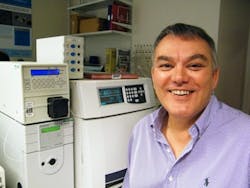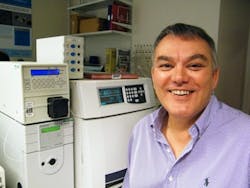Nanotechnology: Better-Tailored Polymers Beckon
Figure 1. David Haddleton is working on emulsion polymerization process. Source: Warwick University.
The process yields sequence-controlled methacrylic multiblock copolymers using sulfur-free RAFT (reversible addition fragmentation chain transfer) emulsion polymerization. Synthesis occurs in an aqueous environment without need for sulfur-containing chemicals. The approach exclusively suits methacrylates and emulsion polymerization. Initial work focused on hydrophobic monomers but efforts now include polymerization of hydrophilic monomers. More details appear in a recent article in Nature Chemistry.
[callToAction ]
“We aim for relatively low molecular weights (less than 100,000) which are suitable for use as additives, compatibilizers, surfactants or as actives in liquid formulations which are able to aggregate into defined shapes and sizes,” notes David Haddleton (Figure 1), a professor in the school’s Dept. of Chemistry and leader of its polymer research group. “I expect this to be of great interest to the polymer industry for use in nanomedicine to automotive applications.”
“The process uses plant which is suitable for normal free radical and emulsion polymerization. There is no requirement for any further specialized equipment and the process is operated as a conventional free radical emulsion polymerization that goes to the high conversions and solids content that would be expected for any emulsion polymerization.”
The research already is attracting interest from industry. “We are working with three multinational companies and talking to two others in quite diverse market sectors,” Haddleton adds.
Pilot-plant trials at industrial partners might begin in late 2017, he believes, with commercialization possible by 2018/2019.

